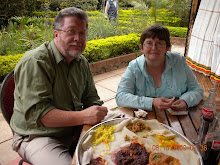 Making a living in rural Kenya
Making a living in rural Kenya is a precarious matter. Once the breadbasket of Kenya, the valley below us is a bare, arid plain. The slopes just beneath the Kijabe escarpment were once forested, and rains came predictably and abundantly. In order to feed hungry bellies, poachers cut down precious, moisture-giving trees to make charcoal. The deforestation then results in gardens that dry away -- leading to more hunger.
People who are the "haves" share with the "have-nots" -- family members, friends. That is the heart of African culture. The local church has a food pantry and many other local believers do what they can for the poor, especially the children in Kijabe and down in the displaced persons camps in the valley. Here at RVA, we contribute all we can.
From our arrival, we are urged to hire housekeepers and gardeners or handy-men. Rift Valley Academy staff members are major employers in the local economy, and our employees make a whopping 65 cents an hour (maximum) -- but no more than that. Too much prosperity breeds jealousy and resentment among peers -- and sometimes harassment of one sort or another.
The pay is hardly charity. These people more than earn their shillings. Each twelve-week quarter has a jam-packed, round-the clock schedule of ministry to these children, in classroom, in activities, in Sunday School, and on weekends. If it were not for Gladys, the Holts would hardly eat, the kids we host in our home would have no cookies, our shopping would be left undone, and we would wade through a mounting pile of dirty laundry and debris. If it were not for Ben, we would be cold, without milk, and left with a host of unresolved household matters frustrating us both.
Insightful friends have helped us understand that midway through the month, a bag of maize meal, flour, or sugar will help our workers make it through until payday; that often a worker could be cooking our meals on an empty stomach. We have found that we are not only helping these two. We are also helping Gladys' s aging mother and, we suspect, others as well. Our fruit and vegetable peelings no longer go into the trash or compost. They go to feed Gladys's cow, because there is very little grass. Gladys is up way before dawn, feeding and hauling water from a creek for her precious livestock, before she comes and ministers to us and to the Carpenters.
It's an humbling reality.

Downtown Kijabe

Both shots taken from a van. I don't want to be a gawking tourist.

Once the breadbasket of Kenya, after three years of drought.

 First, the good gnus...
First, the good gnus...

 An impala graces the horizon...
An impala graces the horizon... While a herd of hippos lurk in the lake and
While a herd of hippos lurk in the lake and We saw the grandmother of all pythons -- well-fed and enormous,
We saw the grandmother of all pythons -- well-fed and enormous,




















